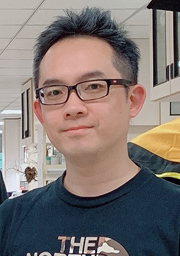|
近五年所發表論文 (Selected Publications) 2018–2023:
|
C-P Wu*, S-H Hsiao, Y-S Wu. Perspectives on drug repurposing to overcome cancer multidrug resistance mediated by ABCB1 and ABCG2. Drug Resistance Updates (2023) Oct; 10: DOI: 10.1016/j.drup.2023.101011. (IF = 24.3; Journal Rank in PHARMACOLOGY & PHARMACY = 2/277)
|
|
C-P Wu*, Y-J Hsieh, H-Y Tseng, et al. The WD repeat-containing protein 5 (WDR5) antagonist WDR5-0103 restores the efficacy of cytotoxic drugs in multidrug-resistant cancer cells overexpressing ABCB1 or ABCG2. Biomedicine & Pharmacotherapy (2022) Oct; 154: 113663. DOI:10.1016/j.biopha.2022.113663. (IF = 7.5; Journal Rank in PHARMACOLOGY & PHARMACY = 23/277)
|
|
C-P Wu*, M Murakami, Y-S Wu, et al. The multi-targeted tyrosine kinase inhibitor SKLB610 resensitizes ABCG2-overexpressing multidrug-resistant cancer cells to chemotherapeutic drugs. Biomedicine & Pharmacotherapy (2022) May; 149: 112922. DOI: 10.1016/j.biopha.2022.112922. (IF = 7.5; Journal Rank in PHARMACOLOGY & PHARMACY = 23/277)
|
|
C-P Wu*, Y-Q Li, T-H Hung, et al. Sophoraflavanone G resensitizes ABCG2-overexpressing multidrug-resistant non-small cell lung cancer cells to chemotherapeutic drugs. Journal of Natural Products (2021) Sep 24;84(9):2544-2553; DOI: 10.1021/acs.jnatprod.1c00584. (IF = 5.1; Journal Rank in PLANT SCIENCES = 33/238)
|
|
C-P Wu*, M Murakami, Y-S Wu, et al. Branebrutinib (BMS-986195), a Bruton's tyrosine kinase inhibitor, resensitizes P-glycoprotein-overexpressing multidrug-resistant cancer cells to chemotherapeutic agents. Frontiers in Cell and Developmental Biology (2021) July; 9: 699571. DOI: 10.3389/fcell.2021.699571. (IF = 5.5; Journal Rank in DEVELOPMENTAL BIOLOGY = 5/39)
|
|
C-P Wu*, T-H Hung, S Lusvarghi, et al. The third-generation EGFR inhibitor almonertinib (HS-10296) resensitizes ABCB1-overexpressing multidrug-resistant cancer cells to chemotherapeutic drugs. Biochemical Pharmacology (2021) Jun;188: 114516. DOI: 10.1016/j.bcp.2021.114516. (IF = 5.8; Journal Rank in PHARMACOLOGY & PHARMACY = 40/277)
|
|
C-P Wu*, C-Y Hung, S. Lusvarghi, et al. Overexpression of ABCB1 and ABCG2 contributes to reduced efficacy of the PI3K/mTOR inhibitor samotolisib (LY3023414) in cancer cells. Biochemical Pharmacology (2020) Jul 4; 180:114137. DOI: 10.1016/j.bcp.2020.114137. (IF = 5.8; Journal Rank in PHARMACOLOGY & PHARMACY = 40/277)
|
|
C-P Wu*, S Lusvarghi, S-H Hsiao, et al. Licochalcone A Selectively Resensitizes ABCG2-Overexpressing Multidrug-Resistant Cancer Cells to Chemotherapeutic Drugs. Journal of Natural Products (2020) May 22;83(5):1461-1472. DOI: 10.1021/acs.jnatprod.9b01022. (IF = 5.1; Journal Rank in PLANT SCIENCES = 33/238)
|
|
C-P Wu*, S. Lusvarghi, P-J Tseng, et al. MY-5445, a phosphodiesterase type 5 inhibitor, resensitizes ABCG2-overexpressing multidrug-resistant cancer cells to cytotoxic anticancer drugs. American Journal of Cancer Research (2020) Jan; 10(1):164-178. (IF = 5.3; Journal Rank in ONCOLOGY = 70/241)
C-P Wu*, S Lusvarghi, J-C Wang, et al. Avapritinib: A Selective Inhibitor of KIT and PDGFRα that Reverses ABCB1 and ABCG2-Mediated Multidrug Resistance in Cancer Cell Lines. Molecular Pharmaceutics (2019) Jul;16(7):3040-3052. DOI: 10.1021/acs.molpharmaceut.9b00274. (IF = 4.9; Journal Rank in PHARMACOLOGY & PHARMACY = 43/362)
|
|
|
|
S-H Hsiao, S Lusvarghi, Y-H Huang, S. V. Ambudkar, S-C Hsu, C-P Wu*. The FLT3 inhibitor midostaurin selectively resensitizes ABCB1-overexpressing multidrug-resistant cancer cells to conventional chemotherapeutic agents. Cancer Letters (2019) Mar; 445: 34-44. DOI: 10.1016/j.canlet.2019.01.001. (IF = 9.7; Journal Rank in ONCOLOGY = 32/317)
|
|
S-H Hsiao, M Murakami, N Yeh, Y-Q Li, T-H Hung, Y-S Wu, S. V. Ambudkar, C-P Wu*. The positive inotropic agent DPI-201106 selectively reverses ABCB1-mediated multidrug resistance in cancer cell lines. Cancer Letters (2018) Oct; 434: 81-90. DOI: 10.1016/j.canlet.2018.07.022. (IF = 9.7; Journal Rank in ONCOLOGY = 32/317)
|
|
C-P Wu*, M Murakami, S-H Hsiao, et al. SIS3, a specific inhibitor of Smad3 reverses ABCB1- and ABCG2-mediated multidrug resistance in cancer cell lines. Cancer Letters (2018) Oct; 433: 259-272. DOI: 10.1016/j.canlet.2018.07.004. (IF = 9.7; Journal Rank in ONCOLOGY = 32/317)
|
|
C-P Wu*, Y-J Hsieh, M Murakami, et al. Human ATP-binding cassette transporters ABCB1 and ABCG2 confer resistance to histone deacetylase 6 inhibitor ricolinostat (ACY-1215) in cancer cell lines. Biochemical Pharmacology (2018) Sep; 155: 316-325. DOI: 10.1016/j.bcp.2018.07.018. (IF = 5.8; Journal Rank in PHARMACOLOGY & PHARMACY = 40/277)
|
|


